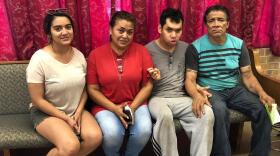The number of asylum-seeking migrants released by Customs and Border Protection grew over the weekend. Hundreds of families arrived at San Antonio’s bus station, and area charities and the City of San Antonio scrambled to provide emergency services. It was an unprecedented humanitarian response.
At the Catholic Charities Community Center on San Antonio’s Westside on Saturday, a month-old infant struggled to breathe.
His family said they were forced to flee their home in Guatemala. The child was born in Mexico while they journeyed to the United States. After being detained by immigration authorities at the border, the family was released.
Now in San Antonio, the season's heavy oak pollen in the air overwhelmed the baby. His worried parents rubbed his back to help him breathe. With his tiny sinuses blocked, he couldn't nurse and breathe at the same time.
San Antonio Archbishop Gustavo Garcia-Siller, observing the scene, called for a nurse, and he translated her questions.
What’s the child’s name, she asked.
The parents responded: Antonio.
Garcia-Siller laughed, recognizing the connection to the city now welcoming these migrant families. The nurse used a blue rubber suction bulb to clear the mucus in Antonio’s nose. He calmed down.
All he needed was a little help. Garcia Siller said that’s what the teams of medics and volunteers tried to do.

“We are blessed to help," he said. "We will not stop helping them, and to do that is just and what is right.”
He said these asylum-seekers are no threat to United States. “You can see it’s mainly families – mothers, fathers, babies. It’s a young population, and of course we were not expecting that many now.”
The spike in numbers of asylum seekers has raised concerns across the South Texas border. More than 76,000 immigrants without authorization surrendered or were apprehended by U.S. Customs and Border Protection in February, the highest number in more than a decade. They appeared in parts of the border that don’t normally see many asylum seekers, like in the Del Rio and Eagle Pass areas southwest of San Antonio.
Detaining families demands more resources and attention from Border Patrol, which they are not equipped to provide. So in late March, the Border Patrol released many migrants from detention facilities in South Texas.
“These people are not breaking the law," Garcia-Siller said. "They are not breaking the law.”
He says they are not illegal immigrants. They requested asylum, which is allowed. They were given documentation by CBP to enter the United States and pursue their claims in immigration court. So calling them undocumented wasn't accurate either.
Approximately 300 migrants arrived in San Antonio over the weekend. The number was so large that for the first time the City of San Antonio opened a pop-up immigration resource center in an empty store front across the street from the Greyhound Bus station.
Children played on the floor as volunteers helped parents figure out their next steps.
San Antonio interim assistant city manager Colleen Bridger said setting up the resource center was an emergency response.
“We set this up to get us through the weekend because folks are getting real tired," she said. "We’ve had a lot of people coming in late Thursday night, late Friday night. And our non-profit partners were just stretched beyond their abilities.”
But the city didn't know how long the center will stay open.
“Even when we talk to Border Patrol and ICE they’re not sure how many people are going to continue to come across the border seeking asylum,” Bridger said.

In the past, immigrants released from CBP detention arrived in San Antonio with travel plans and bus tickets. The arrangements were made before they left detention.
But many in this wave of asylum seekers in late March didn’t spend much time in detention, and they were dropped off with no money, no bus tickets and no idea of how to get to their final destination.
And there were so many immigrants released that almost all of the buses leaving San Antonio were sold out – leaving the families stranded unil Monday or later. That required non-profits to buy bus tickets and hotel rooms for the families.
Antonio Fernandez, the CEO of Catholic Charities, said unless they received some kind of financial support from the city they would soon run out of money.
“I asked for financial support from the city," he said. "I hope they can give it to us. Because sooner or later I won’t be able to do this anymore.”
The flow of Central American migrants arriving at the border shows no sign of slowing down. So many ask the question: How much longer can San Antonio's welcoming open arms stay open?
David Martin Davies can be reached at DMDavies@TPR.org and on Twitter at .
Copyright 2020 Texas Public Radio. To see more, visit . 9(MDAxODQzOTgwMDEyMTcyNjI4MTAxYWQyMw004))







